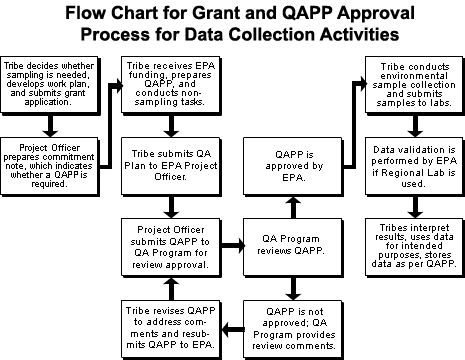Support for Environmental Assessment Grants for Tribes in Region 9
- Introduction
- Quality Assurance Requirements
- Planning for Data Collection
- Analytical and Technical Support
Introduction
All EPA-funded projects in which environmental measurements are taken must have a written Quality Assurance Project Plan (QAPP) or a Sampling and Analysis Plan (SAP) that contains the required quality assurance (QA) elements.
The QAPP is a planning document that details how the project will meet EPA requirements and project-specific data needs to generate usable environmental information. QA publications that provide guidance for developing QAPPs and SAPs can be ordered or downloaded.
Quality Assurance Requirements
Federal regulations and EPA policy requires that the collection of environmental data through extramural agreements, such as General Assistance Program (GAP) grants, be supported by a QAPP.
Any organization performing work for EPA under these programs must be able to show that the data it collects are of the quality required for any decision it makes regarding the protection of public health and the environment.
The Region 9 QA Program must review and approve all QAPPs or SAPs before the organization may collect any environmental measurements.
Planning for Data Collection
- What environmental issue is the data collection intended to address?
- Will it be a one-time sampling event or an on-going monitoring activity?
- What decision is to be made as a result of the project?
- What quantity and quality of data are needed to be able to make the decision?
- What environmental matrix is to be tested? This might include surface water, ground water, soil, sediment, sludge, air, solid/hazardous wastes, or vegetation.
- What type of measurements are planned? Chemical analyses (for example, volatile organic compounds, water quality parameters, metals, pesticides), physical analyses (turbidity, flow, etc.), bioassays (toxicity tests), or plant or animal surveys might be included.
- Will the tribe or EPA procure the sampling and/or laboratory services?
- What is the planned sampling and analysis schedule?
 The flow chart describes each step of the grant and QAPP approval process from submitting the grant application to getting the QAPP approved and submitting environmental sample collections to labs.In order to benefit fully from all of the available EPA resources, the tribe's environmental services staff or its consultant should contact the QA Program as soon as the scope of the project has been defined. The QA Program can provide and connect the tribe with the appropriate QA Program or Region 9 Laboratory resource.
The flow chart describes each step of the grant and QAPP approval process from submitting the grant application to getting the QAPP approved and submitting environmental sample collections to labs.In order to benefit fully from all of the available EPA resources, the tribe's environmental services staff or its consultant should contact the QA Program as soon as the scope of the project has been defined. The QA Program can provide and connect the tribe with the appropriate QA Program or Region 9 Laboratory resource.
Published guidance documents, helpful in the preparation of QAPPs or SAPs, are listed at the end of this fact sheet. For one-time or limited sampling events for which the Region 9 Laboratory services will be used, a streamlined SAP format is available.
Once a draft of the QAPP or SAP is completed by the Tribe, it is submitted to the EPA Project Officer. The Project Officer will forward the plan to the QA Program for review. The review normally takes about three to four weeks.
Review comments are sent directly to the Tribe. In responding to the comments, the tribal staff should work directly with the QA Program. A revised plan must be resubmitted to EPA and approved by the QA Program before environmental measurements may be taken.
The interactions between the Tribe, the Region 9 Grant Management Program, the Project Officer, and the QA Program are represented in the following diagram:
Analytical and Technical Support
EPA Region 9 provides a variety of field sampling and analytical services. Training is also available on subjects related to environmental sampling, including preparation of QAPPs and SAPs, sample collection, and explanation of analytical procedures. These services may be accessed by placing a request through your EPA Grant Project Officer.
For specific information about analytical services, contact the Regional Sample Control Coordinator, QA Program Manager (510) 412-2389 (RSCC) in the Region 9 Laboratory. The RSCC can connect you with the available analytical services, and will provide project tracking numbers, chain-of-custody forms, and sample custody seals.
